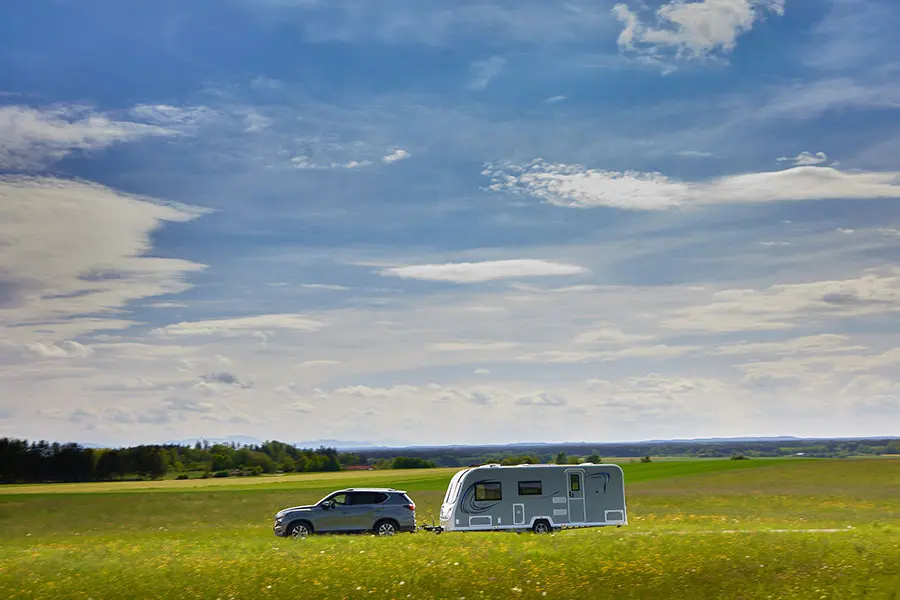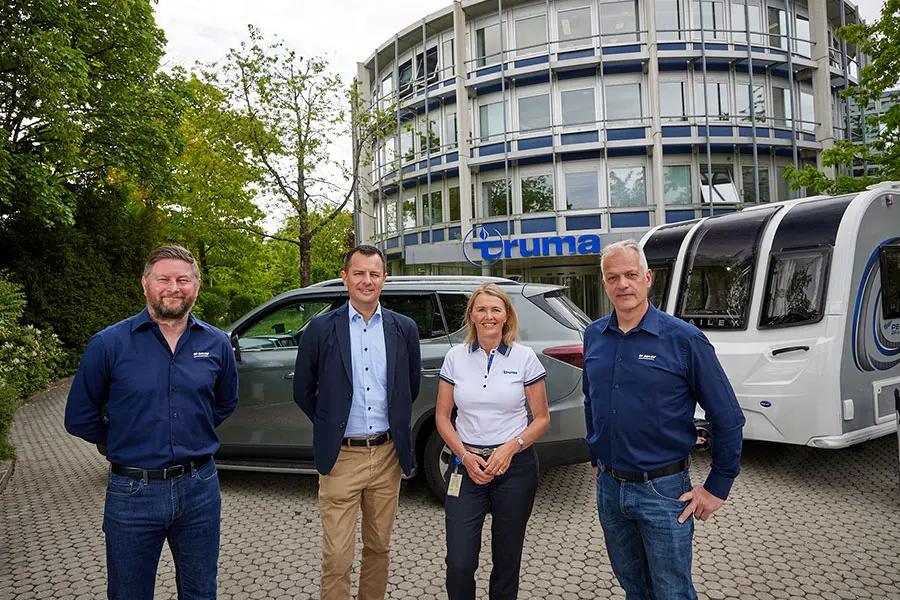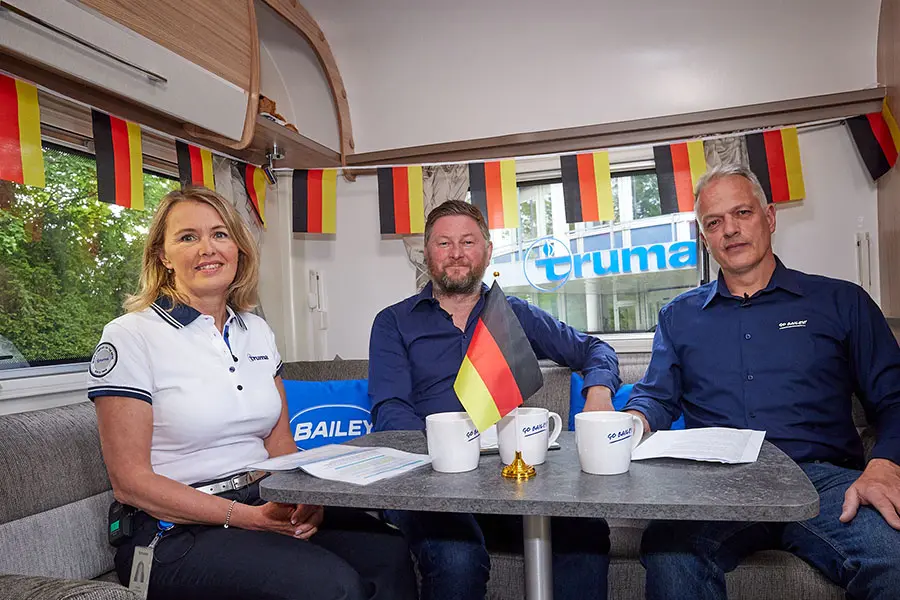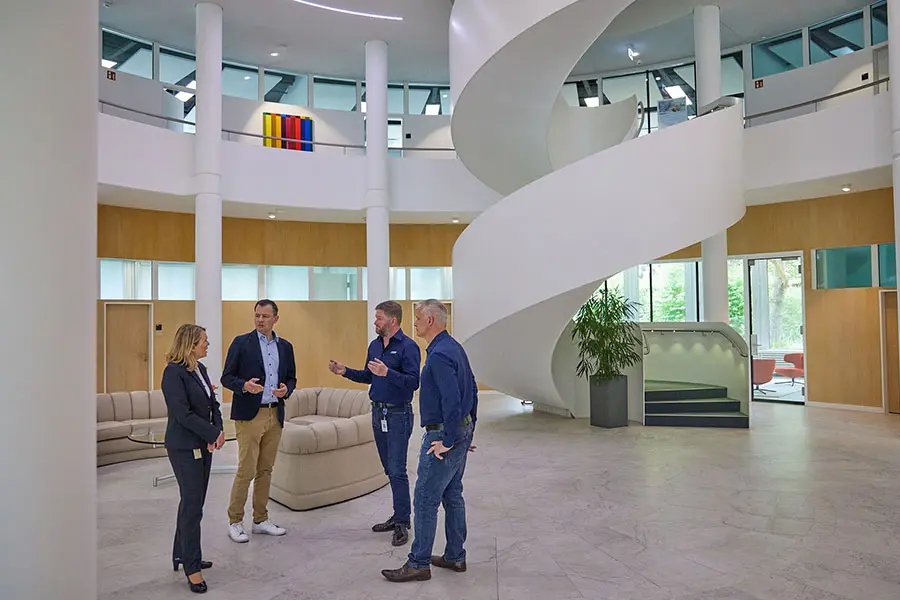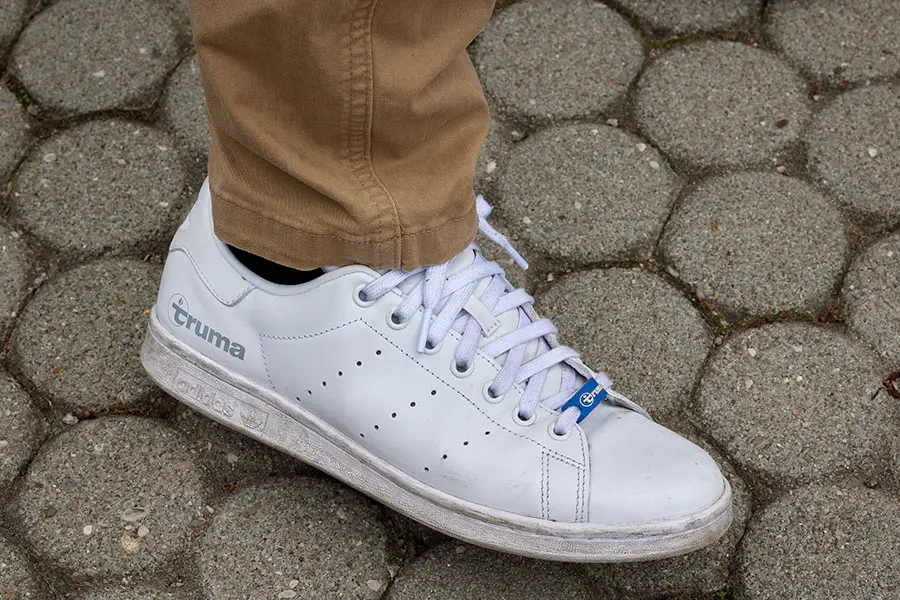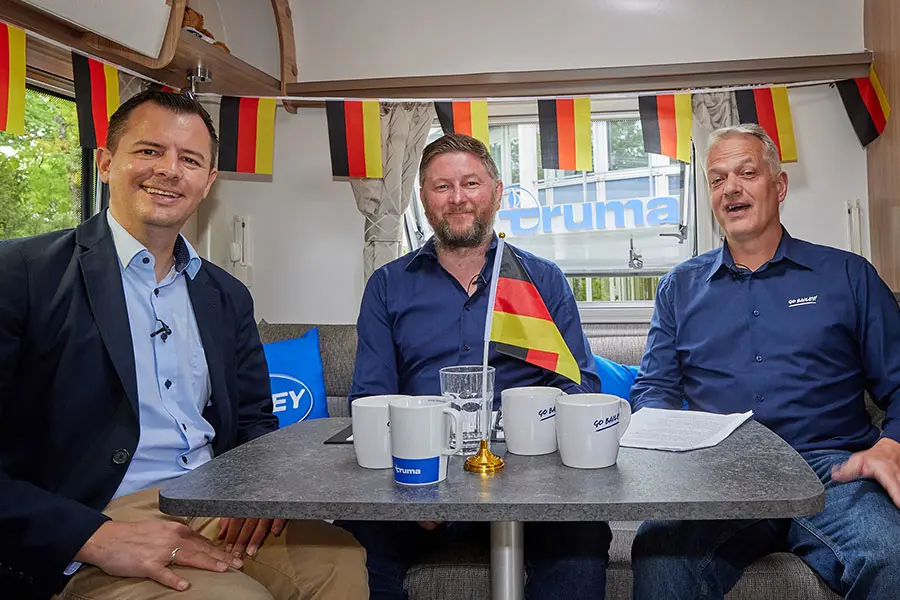Truma - Bavaria, Germany
Well known for their heating systems, for the past few years, Truma has also expanded their business to motorhomes and caravan accessories.
During this visit, Simon and Lee met with Head of Intercompany Management, Angela Von Schenk and Director of Supply Chain, Norbert Kreitmeir who gave us an insight of what goes on at Truma headquarters in Putzbrunn.
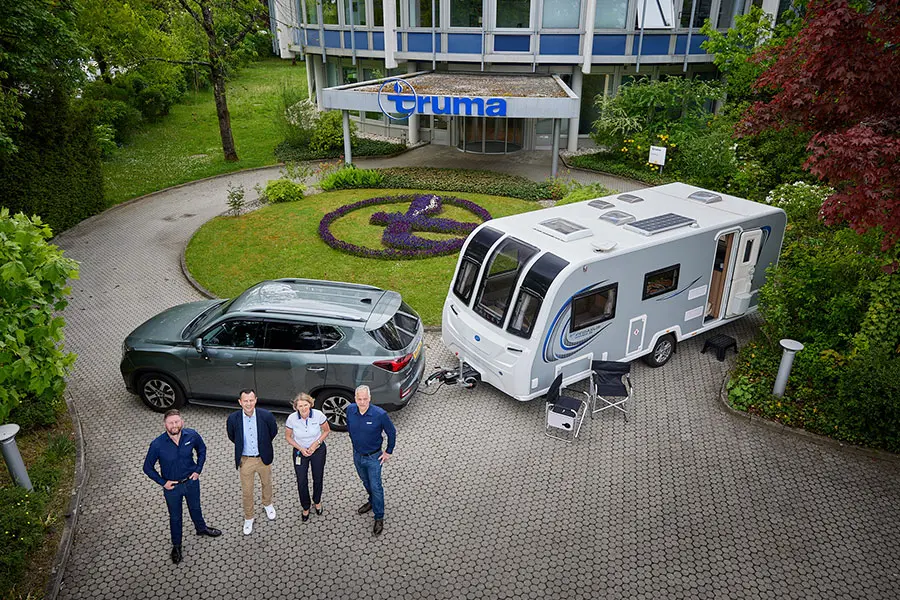
SIMON: Angela, we are at Truma headquarters and this is where your heating systems are made. Are the other products you offer also manufactured here in Germany?
ANGELA: Yes, everything is manufactured at this site. Besides the heating systems, we also do the air conditioning systems here. Our gas regulators are the only products that are not manufactured here but in our own factory in Italy.
SIMON: So everything is reasonably local… You’re very much a family business. Very similar to Bailey in that respect. Could you tell us a bit more about the history behind Truma?
ANGELA: The company started right after World War 2 , when Philipp Kreis, the owner and founder of the company, came back from war. He was an English teacher and the electric light in his classroom kept breaking down. He was very technical, so he developed a gas light. At the time, gas was widely available, but electricity would break down every time he wanted to hold a class. Then other people saw that there was light in his classes, and that’s how it all started, with a gas lamp.
SIMON: And the family is still involved today…
ANGLEA: Yes.
"The history of Truma started with a gas light that our founder developed right after WW2"
SIMON: You have your operations here in Germany, but what makes you different from some of our other overseas suppliers is that you have an operation site in the UK based in Derbyshire.
ANGELA: Yes. When we started to do business in the UK we found that it would be very tricky to do it from here in Germany and to supply the goods directly to the manufacturers in the UK (OEMs). The UK OEMs have been quite demanding…
SIMON & LEE: Surely not! (laugh)
ANGLENA: Therefore we decided that we needed to have a subsidiary in the UK, a base to operate from and to customize our products for the UK market.
Returnable packaging was also one of the requirements we wanted to fulfil. And we couldn’t have done that from here in Putzbrunn. The returnable packaging you get comes from Truma Limited in Derbyshire, where we customise and configurate the kits as you want them.
SIMON: I didn’t realize that the returnable packaging was a UK initiative… We get these magnificent plastic crates that turn up with all your equipment and all the packaging goes back to you once we are finished.
ANGELA: Yes. Getting all the crates back to Germany wouldn’t be sustainable.
SIMON: You talked about customization of the product. What sort of customization do you do on the heating systems after they’ve left Germany? What do they do in the UK before they are delivered to Bailey?
ANGELA: Truma Limited puts different plugs on and connectors so they are delivered to you as a plug and play system instead of having to connect all the cables on the line.
SIMON: So they make it simple…
ANGELA: Yes, they kit it up as you require on your production line. For example they pre-cut the ducts to adapt to the different lengths and ease the process in your production line.
I think that, to do this the business has to be local and close to the OEMs so we can be flexible and react to the requirements.
"In our site in Derbyshire, we adapt our kits to the requirements from the Bailey production line"
LEE: In previous trips we have done, like when we went to the Arctic, we’ve always been kept warm by Truma. We also visited the Truma Limited site in Derbyshire, and we spent some time in the cold chamber there. What processes and tests do you have behind the scenes to make sure that if someone’s away on a caravan holiday, they will stay warm whatever the season?
ANGELA: We have a lot of experience. We have done endless cold chamber tests here in Putzbrunn and in Derbyshire. That experience allows us to know how to best distribute the heat in a caravan or motorhome. And we also offer the possibility to come to our cold chambers and test the heating system in practice in your vehicles.
SIMON: I know you work very closely with our design team so when we want to release a new model, you guys get involve at a very early stage. We work out together how to best install your heating systems and ensure it gives the best possible results.
ANGELA: Yes. Some of my colleagues work very closely with you engineering team. They are always there when the first off products come out of the production line to ensure the product is fitted correctly. And they come regularly to check that this stays like that also in serial production.
SIMON: It’s what we call a vendor vet. You sign off the installation, so it’s done do the required standards.
LEE: I was lucky enough to spend a day with the Bailey team in the factory a couple of weeks ago. I could see how that vendor vet process fits in place. Obviously, I wasn’t allowed to install your heating system because you have to be gas check for that, but it showed how everything fitted together perfectly and made the process of assembling the caravan a much easier one.
"Camping is part of Truma's DNA and and we encourage our staff to experience it"
LEE: Can I take this opportunity to say that you’re a leisure vehicle owner as well, aren’t you?
ANGELA: Yes.
LEE: That must help with products as well. Not just product knowledge, but also how they work?
ANGELA: Yes. I have a private motorhome, but the company also has a pool of motorhomes and caravans to give every employee the opportunity to physically have the experience of going camping.
LEE: That must help enormously. Not just with the end product, but the design process as well. It’s not until you use the product properly that you can really understand how it can make life easier.
ANGELA: It makes it a lot easier to understand the product and what the customer needs are. It brings us closer to the customer to understand their requirements, and also the different needs that come with the different types of camping: winter camping, every now and then camping, every weekend camping, …
LEE: Being a family company, does it make it easier to follow the process to from conception to end user experience?
ANGELA: I think so, yes, because the family has always camped. Alexander, who is now the CEO of the Truma Group, has his own motorhome. I would say it’s in our DNA.
LEE: Have you looked to expand Truman’s business into accessories, such as movers, aircon units and, and such likes.
ANGELA: The aftermarket program is a big part of Truma. We have dedicated retail teams in both the UK and on the continent who works very closely with the dealers to make sure our products are the number one choice to end consumers.
It is our goal to expand and to find more products for the aftermarket. The latest one is the Truma cooler, which we have just launched at the NEC Show in February.
LEE: Throughout the trip we’ve asked on social media, if anyone had any questions that they would like to ask. One of our followers asked: With the Truma Combi being round, and the bed base where it normally lives is square, how come that the Combi is round, rather than being square, where it might be easier to package it?
ANGELA: The round form is due to the design and the heat exchanger of the Combi, which is round.
To make it square we would have to put a square housing around it, which would then take more space and we tried to be as slim as we can to fit in almost every space in a caravan.
LEE: One other question we had. This one is probably not about Truma, but more about the German leisure industry market as a whole. One of our followers was touring down through Germany and noticed that the demographic and the ages of people were possibly slightly younger than the UK. Has that always been the case, or have you had an influx of younger caravans and motorhomers since COVID?
ANGELA: Yes, that’s definitely the case. Younger people have been attracted to our industry. However, there was a very strong trend to camper vans and that is more with the younger people.
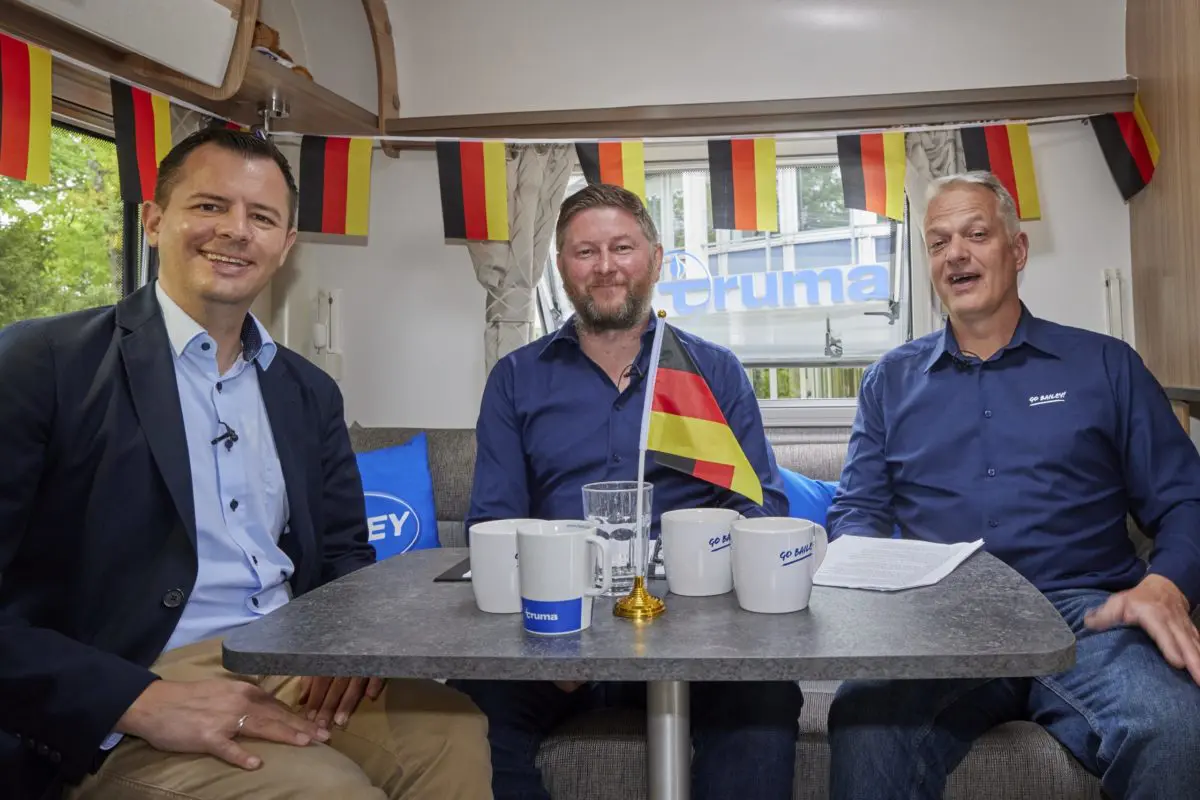
SIMON: So we are joined by Norber, Director of Supply Chain Management at Truma and probably the man with the toughest job in any business over the last couple of years.
Two huge challenges have come your way. First is Brexit. Obviously that was a UK initiative, but how has that affected you as an European manufacturer in terms of supply to the UK?
NORBERT: Our advantage was that we only have a few suppliers in the UK. There’s one big gearbox supplier for our movers and another plastic and electronic parts supplier. So we could handle that very easily.
Everybody told us to be aware of some issues at the border, no trucks available, customs, etc. so we build up a few weeks of buffer stock. That was a successful story for us as we didn’t run out of components and could handle that transition easily.
Of course after, that, Brexit for us has meant that we have to do some more paperwork on customs and so on, but normally it runs very easily.
SIMON: That’s really interesting. We didn’t really think about supply from the UK as well as supply to the UK…
NORBERT: Yes. That’s another big challenge. We also support our TRUMA UK colleagues and we built up some buffer stock there as well to ensure that we were a hundred percent on time for our customers.
SIMON: And I have to say, from a manufacturer’s point of view, it was pretty much seamless from TRUMA. You guys gave us next to no problems at all in terms of supply, both through Brexit and also through COVID, which I think was probably a bigger challenge and one that we weren’t expecting at all…
NORBERT: Yes, that’s completely right. We didn’t expect how much impact we would have. In the first days of COVID, we only had the problem from China. The electronic business is normally mainly based in China so we source some components from air conditioners and electronic parts there.
For that, we also organize different things. For example, fastening the supply chain by flying some products in, instead of shipping them in. That was the first reaction when we heard about COVID. Then, a few weeks later, COVID was everywhere and very present in Europe.
In the first weeks, in April 2020, we stopped production for a few weeks to avoid staff getting affected on the shop floor here in Putzbrunn.
A few weeks later we defined some rules on how to handle the COVID situation wearing masks, more distance between working stations, we added some racks between people so that they could social distance and work comfortable and we implemented a test station so staff could test themselves and asked them to stay home if there was any kind of flu or symptoms.
So that was the priority, to keep staff safe.
Then we had to handle the supply chain, because nobody knew exactly how many companies stopped their business, or what was the reaction in Asia. That was a big challenge, but we could manage it firstly because we have a very bright supply chain in Europe. We have a local supply chain in Europe, Eastern Europe, Czech Republic, Poland, and so on. And of course, Germany and Southern Europe.
That was the advantage for us as we didn’t have long lead times and, with some effort, we could handle it. We had no big issues on supply chain interruption because most of our suppliers didn’t stop their production.
Of course, they had some disruptions with staff being sick, or isolating with COVID but they never stopped their production completely.
"We own the tools to make some of our parts so we can be more flexible with our suppliers"
SIMON: What are your key components and raw material?
NORBERT: There are different types. Our heaters and our air conditioning systems involve all kind of components: plastic parts, metal parts, sheet parts, die casting parts…
So we use a huge variety of components. But we have implemented a second source strategy for key components for years, meaning that, when we can, we have second source.
We also own the tools to make our parts. So, for example, when we need injection moulding parts and plastics, we own the tools to make them, so we can be flexible on who takes our tools and produce the part.
We are also in close contact with the suppliers to see how we can support them. We get pre-approvals to buy materials for our supplies so they can get supplies from bigger companies and get the raw materials in.
That has helped us to handle the situation better as the partnership between Truma suppliers and ourselves have worked very well.
LEE: With regards to materials, many businesses we have visited during this trip have seen a rise in raw material costs. Would you say that’s been the same for Truma?
NORBERT: Yes. That’s the same for Truma. For example we use aluminium and copper for many of our components. Those materials have doubled the price in the past two years. Also aluminium and plastic parts, and especially electronic parts are quite hard to get.
SIMON: Looking to the future, how are you looking at the sustainability of your business moving forward and at reducing the carbon footprint of TRUMA operations?
NORBERT: That’s also a big challenge for us because we use plastics in our products, and we look at ways we can make it sustainable.
We try to make our products recyclable and make them with components that are at the same time made with recycled materials. We try to use returnable and recyclable packaging and try to keep our supply chain very local and avoid imports from the Far East when possible.
We also work on reducing waste in production. We have some lean actions in place and have started a big program to avoid any kind of waste during the manufacturing process.
LEE: When we came in this morning, we learnt that the building where your canteen is located gathers rainwater for the toilets to flush. It seems quite a forward-thinking thing to do when the building was built in the 1990s. Would you say that’s always been part of the TRUMA philosophy?
NORBERT: Yes, that has always been Truma’s aim, to be one step further from the others. That’s always been our philosophy. Not only in sustainability but also in product development, supply chain, …
SIMON: It’s all of part of the family business DNA, which is very present here today.
END
Images from our day at Truma
Take a look at the gallery below to see images from our day at Truma. Hover over the information icon on each photo to read the caption.






